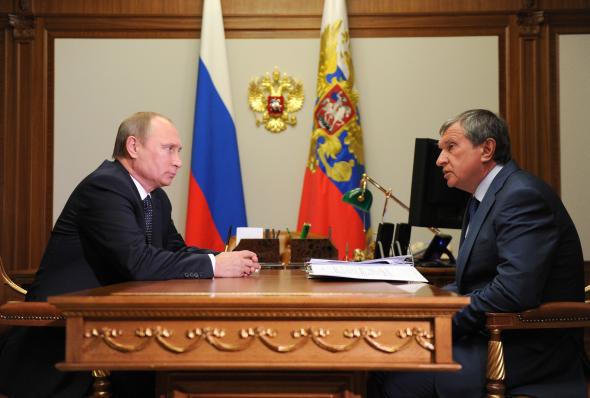The White House announced today that it is imposing new targeted sanctions on seven Russian officials as well as 17 companies linked to Vladimir Putin’s “inner circle.”
The biggest new names on the sanctions list are Igor Sechin, a longtime Putin ally and president of the state-owned oil company Rosneft, and Dmitry Kozak, Russia’s deputy prime minister. (Another frequently discussed potential sanctions target, Gazprom CEO Aleksei Miller, apparently escaped this round.)
Will these measures prove any more effective at changing Putin’s “calculus,” as President Obama put it, than the previous round of sanctions in March? Obama himself seemed ambivalent, telling reporters, “We don’t yet know whether it is going to work,” at a press conference in the Philippines. One senior administration official was more blunt, telling the New York Times, “We don’t expect there to be an immediate change in Russian policy.”
There’s good reason to be skeptical that sanctions will deter action by a Russian government that seems to have already priced in the economic costs of its activities in Ukraine, and may have a much bolder geopolitical project in mind.
So why even bother with sanctions at all? Is it simply so that the U.S. appears to be doing something?
U.S. officials suggested in their comments today that the sanctions are a way of signaling to Putin’s inner circle that America is capable of inflicting further pain if its demands are not met, though I don’t imagine that will come as news to any of these guys.
Peter Baker of the Times suggested over the weekend that some of the sanctions could be meant to shine a harsh light on Putin’s off-the-books personal wealth, though it’s also not clear that Russian citizens really care that much about the rumors of their president’s secret dachas and offshore accounts.
The best reason for sanctioning Putin that has little to do with influencing his decisions on Ukraine may be that, as Dan Drezner argued the last time around, it will gain the U.S. some leverage for the future.
Indeed, sanctions are generally pretty bad at deterring bad behavior by hostile regimes, but the carrot of lifting sanctions has been pretty effective lately. It’s hard to believe that the U.S. could have made as much diplomatic progress as it has with countries like Iran or Myanmar if it hadn’t been able to offer sanctions relief in exchange for concessions.
The relationship between the United States and Russia has been profoundly damaged, probably for years to come, by the Ukraine crisis. Even if the U.S. may not be able to do much to influence Putin now, it’s seems basically inevitable that the two superpowers will face another crisis soon and it could certainly help to have something concrete to offer Russia’s most powerful people in exchange for cooperation.
Granted, in the short term, that’s pretty cold comfort for Ukraine.
